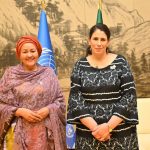Breaking the Chains: Why Poverty and Hunger Reduction Is Nigeria’s Path to Lasting Security and National Stability
By Dr. Aiyeku Olufemi Samuel
Nigeria is a nation brimming with natural resources, cultural wealth, and human potential. Yet, over 133 million Nigerians live in multidimensional poverty, according to the National Bureau of Statistics (2022). It is no coincidence that the nation also faces alarming levels of insecurity, youth restiveness, and social instability.
In 2024, Nigeria’s poverty rate has surged to approximately 46%, with over 100 million citizens living below the national poverty line. This marks a significant deterioration compared to 2018/2019 figures, where around 30.9% lived below the international extreme poverty threshold of $2.15 per day, according to World Bank data. Some projections now estimate that over 54% of the population faces multidimensional poverty, underscoring both income and non-income deprivations. This widening crisis threatens not only household welfare but the nation’s broader stability.
One of the most striking revelations comes from the World Bank’s April 2025 Poverty and Equity Brief, which shows that rural poverty has escalated to a staggering 75.5%, compared to 41.3% in urban areas. This clearly illustrates the regional and structural imbalances in Nigeria’s development agenda. The north, in particular, continues to bear the heaviest burden, driven by weak infrastructure, conflict, displacement, and historical neglect. This rural-urban divide has deep implications for peacebuilding, security, and migration patterns, as poverty pushes young people toward urban centers or illicit survival strategies.
Several interconnected factors fuel this deepening poverty crisis. Economic insecurity, worsened by policy inconsistencies and global shocks, has made livelihoods unpredictable.
Rising inflation, especially in food and transport costs, has eroded the real income of millions. The removal of fuel subsidies — while fiscally necessary — has inadvertently increased production and living costs for already vulnerable communities. For many families, it’s now a daily struggle to choose between food, education, and healthcare.
Job creation remains stagnant despite a rapidly growing workforce. With over 1.8 million Nigerians entering the labour market annually, the lack of sufficient economic opportunities forces many into informal, insecure, and low-paying jobs. Unemployment and underemployment are key drivers of social unrest and youth disillusionment. For a nation where 62% of the population is below 25 years old, failure to harness this demographic dividend may worsen insecurity, crime, and voter apathy.
Beyond income-based poverty, Nigerians face multidimensional poverty, which includes poor access to education, healthcare, clean water, sanitation, and digital connectivity. The National Multidimensional Poverty Index (MPI) Report 2022 revealed that over 63% of Nigerians are deprived in one or more basic dimensions of well-being. When these indicators are weak, human capital collapses. And when human capital collapses, national productivity and peace become elusive.
Ultimately, the poverty narrative in Nigeria is no longer just about numbers — it’s about survival, dignity, and the soul of a nation. As the cost of living rises and hope diminishes, what must the government and stakeholders do differently? It begins with strategic investments in agriculture, rural infrastructure, SME support, education reform, and inclusive social protection mechanisms. Without bold and inclusive action, Nigeria risks plunging deeper into a poverty trap where insecurity becomes the norm, not the exception.
But here’s the fundamental question:
Can any meaningful national development or security framework thrive when hunger and poverty rule the land?
The answer is an emphatic no. Where people struggle to feed, crime breeds. Where there are no jobs, frustration replaces patriotism. Where families live on less than a dollar a day, radical ideologies, banditry, terrorism, and kidnapping become tools of survival.
Let’s connect the dots: Poverty + Hunger = Insecurity.
Key Challenges at a Glance:
High unemployment rate of over 33% (NBS 2023)
Over 25 million Nigerians projected to face acute food insecurity in 2024 (FAO)
Youth bulge with limited access to quality education and economic opportunities
Shrinking agriculture due to insecurity in rural areas
Weak implementation of social protection policies
Corruption and poor governance structures
Rhetorical Question:
Why is insecurity worsening despite billions allocated to defense budgets?
Because no amount of guns and surveillance can pacify a hungry population.
The Way Forward: Real Solutions Beyond Lip Service
Revamp Agriculture for Food Security: Return to the farms with mechanized support, youth incentives, access to seedlings, and micro-finance to make farming attractive again.
Invest in Rural Development: More than 50% of Nigeria’s poor live in rural areas. Good roads, schools, irrigation systems, and storage facilities will make a significant difference.
Scale Up Social Investment Programs: The National Social Investment Program should go beyond tokenism. It must be data-driven, accountable, and targeted.
Vocational & Technical Education for Youths: Every youth trained in a skill is one less potential criminal. Expand TVET centres and provide start-up kits.
Inclusive Economic Policies: Pro-poor economic reforms, support for SMEs, and access to affordable credit should be prioritized.
Public-Private Partnerships: Encourage corporate social responsibility to address hunger and unemployment in hard-to-reach communities.
”A nation that can not feed its citizens is not sovereign. It is simply surviving on borrowed peace.”
~ Dr. Aiyeku Olufemi Samuel
”You can’t preach peace to the belly of a hungry man. Food is justice; bread is security.”
~ African Proverb
Recommendations for Policymakers and Stakeholders:
Declare food security and poverty alleviation as national emergencies.
Mandate all local governments to submit quarterly poverty and food data.
Implement community policing alongside poverty reduction for safer neighbourhoods.
Incentivize states that show measurable improvements in livelihoods.
Launch “No Nigerian Goes to Bed Hungry” campaign with real-time dashboards and transparency.
Final Thoughts:
It is not enough to build military bases or deploy drones. We must build silos, train farmers, support households, and elevate dignity.
Until Nigeria faces poverty and hunger as core national security threats, our solutions will remain reactionary rather than revolutionary.
Poverty is the real insurgent. Hunger is the silent terrorist. Let’s fight them head-on.
Dr. Aiyeku Olufemi Samuel
Co-Founder & Lead Consultant, Global Human Capital & Energy Management Limited
Governance Analyst|
Development Economist|
Policy Consultant| Strategic Development Advocate| Climate Action Enthusiast | Sustainability & Impact Investing Specialist|Girl-child Advocacy| PPP & CRM Specialist /Sales Innovation & Transformational Results-Driven Business Analyst
#EndPovertyNow #FoodSecurityFirst #NigeriaDevelopment #YouthEmpowerment #NationBuilding #SustainableSolutions #SecurityStartsWithFood
#MakingRealSenseSeries












